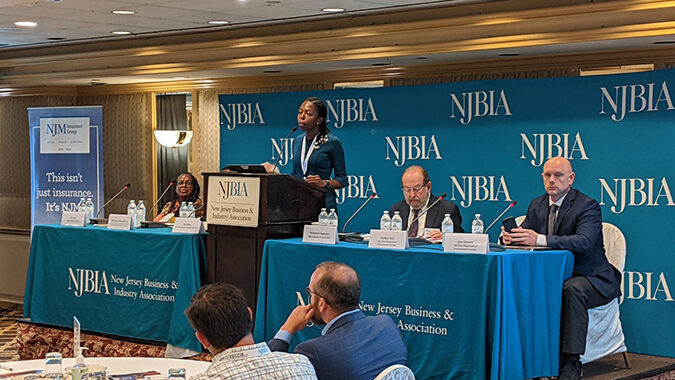A new environmental rule that will radically change how permits are issued to businesses in two-thirds of the state drew close to 200 people to an NJBIA seminar Friday to better understand the proposal as well as the process for preparing new state-required Environmental Justice Impact Statements (EJIS).
New Jersey is the first state in the nation to require mandatory permit denials if an environmental justice (EJ) analysis determines a new facility will have a disproportionately negative impact on overburdened communities. To implement that landmark 2020 law, the Department of Environmental Protection on Monday published its 153-page draft EJ rule proposal, which will be the subject of four public hearings in July prior to the closing of the official public comment period on Sept. 4.
“DEP is now going to be required to make siting and permitting decisions considering cumulative impacts of facilities in areas of overburdened communities that are already overburdened by pollution,” said attorney Raymond Papperman, of Sills Cummis & Gross, who moderated the first panel discussion featuring EJ community advocates and DEP officials.
Overburdened communities are determined by U.S. census blocks that are smaller than an entire municipality - and it's not only facilities in cities that are impacted. The law defines an overburdened community as a census block where at least 40% of residents identify as minority, 35% of households are low-income or 40% have limited English proficiency.
“These are census blocks, these are not municipalities,” stressed John Valeri Jr., an attorney with CSG Law and an expert in environmental permitting. “We are in New Jersey and census blocks of those who could fall under the definition of an overburdened community exist in a variety of different communities,” including neighborhoods located within affluent municipalities.

“This is not about simply saying I’m not in an urban area and therefore I’m not in an overburdened community,” Valeri said. “That is not accurate.”
DEP has created an interactive online EJMAP tool to help businesses determine whether their existing facilities or proposed projects are located within an overburdened community, and whether that overburdened community has “additional stressors” that require the submission of more detailed information with the EJIS. Technical guidance for how to use the mapping too can also be found online here.
Valeri said DEP’s proposed rule also requires businesses to engage in “meaningful public participation” once the EJIS and any required supplemental information has been prepared. This includes providing 60 days’ notice of a public hearing, mailing notices via certified mail to property owners and residents within 200 feet of the facility’s location, publishing notices in two newspapers (including one non-English newspaper, if applicable), posting signage at the site of the facility, and sending invitations to DEP, municipalities, and EJ community advocates.
The public hearing must be held no earlier than 6 p.m. on a weekday, be recorded, and include a virtual option for those who cannot physically attend. The recording must be available online for at least 30 days while the public comment period remains open after the hearing.
Valeri predicted the noticing timeframe and public comment deadlines could cause confusion for permit applicants.
“The public comment period has to outlast, again, at least 30 days after the hearing and be no less than 60 days total,” Valeri said. “Again, you’re doing a little bit of math as to when this all has to occur.”
DEP has scheduled public meetings for businesses to learn more about the EJ rule:
- Monday, July 11, from 3 p.m. to 5 p.m. and 7 p.m. to 9 p.m. at the NJDEP public hearing room, 401 E. State St., Trenton
- Wednesday, July 13, at 6:30 p.m. at the Ray and Joan Kroc Corps Community Multipurpose Rooms, 1865 Harrison Ave., Camden
- Wednesday, July 27 at 6 p.m. at the New Jersey Institute of Technology Campus Atrium Center, 150 Bleecker St., Newark
- Thursday, July 28 at 6 p.m., NJDEP online meeting




